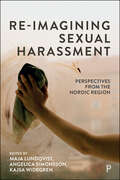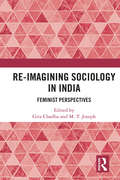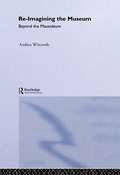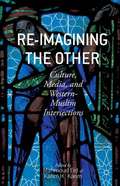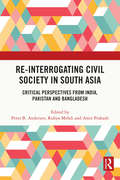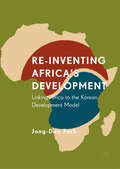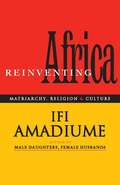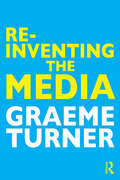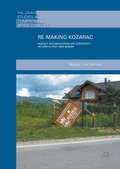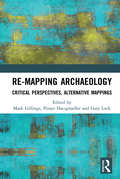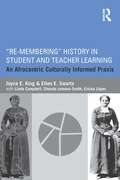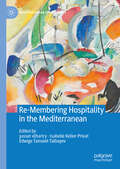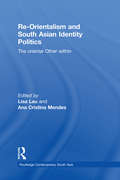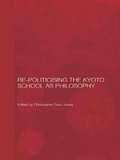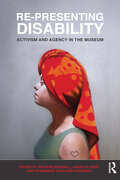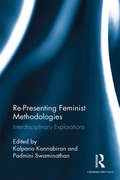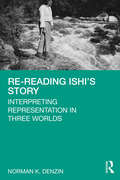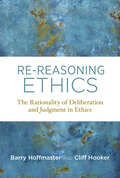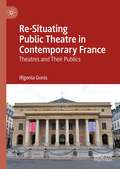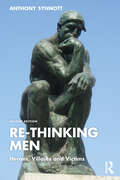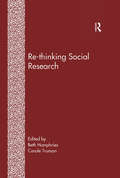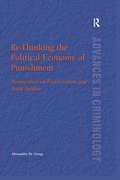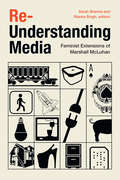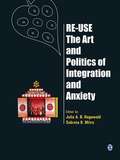- Table View
- List View
Re-Imagining Sexual Harassment: Perspectives from the Nordic Region
by Maja Lundqvist, Angelica Simonsson and Kajsa WidegrenEPDF and EPUB available Open Access under CC-BY-NC-ND licence. The #MeToo movement sparked many debates and increased the demand for more problematised perspectives on the issue of sexual harassment. This book opens up new understandings of sexual harassment by bringing researchers, writers and policy makers in the Nordic region into dialogue within an ambitious volume. It asks what role juridical frameworks can and should play in prevention and raises questions about how the image of Nordic states – as gender equal, colour-blind and with strong welfare – affects the work against sexual harassment in the region. Re-imagining definitions of justice, violence, exploitation and work, this book offers knowledge of immediate importance for everyone working to prevent sexual harassment, through research, policy making or in everyday practice.
Re-Imagining Sociology in India: Feminist Perspectives
by Gita Chadha M. T. JosephThis book maps the intersections between sociology and feminism in the Indian context. It retrieves the lives and work of women pioneers of and in sociology, asking crucial questions of their feminisms and their sociologies. The chapters address the experiential realities of women in the field, pedagogical issues, methodological frameworks, mentoring processes and artistic engagements with academic work. The volume’s strength lies in bringing together Indian scholars from diverse social backgrounds and regions, reflecting on the specificity of the Indian social sciences. The chapters cover a range of key areas, including sexuality, law, environment, science and medicine. This volume will greatly interest students, teachers, researchers and practitioners of sociology, women’s studies, gender studies and feminism, politics and postcolonial studies.
Re-Imagining Ukrainian-Canadians
by Rhonda L. Hinther Jim MochorukUkrainian immigrants to Canada have often been portrayed in history as sturdy pioneer farmers cultivating the virgin land of the Canadian west. The essays in this collection challenge this stereotype by examining the varied experiences of Ukrainian-Canadians in their day-to-day roles as writers, intellectuals, national organizers, working-class wage earners, and inhabitants of cities and towns. Throughout, the contributors remain dedicated to promoting the study of ethnic, hyphenated histories as major currents in mainstream Canadian history.Topics explored include Ukrainian-Canadian radicalism, the consequences of the Cold War for Ukrainians both at home and abroad, the creation and maintenance of ethnic memories, and community discord embodied by pro-Nazis, Communists, and criminals. Re-Imagining Ukrainian-Canadians uses new sources and non-traditional methods of analysis to answer unstudied and often controversial questions within the field. Collectively, the essays challenge the older, essentialist definition of what it means to be Ukrainian-Canadian.
Re-Imagining the Museum: Beyond the Mausoleum (Museum Meanings)
by Andrea WitcombRe-Imagining the Museum presents new interpretations of museum history and contemporary museum practices. Through a range of case studies from the UK, North America and Australia, Andrea Witcomb moves away from the idea that museums are always 'conservative' to suggest they have a long history of engaging with popular culture and addressing a variety of audiences. She argues that museums are key mediators between high and popular culture and between government, media practitioners, cultural policy-makers and museums professionals. Analyzing links between museums and the media, looking at the role of museums in cities, and discussing the effects on museums of cultural policies, Re-Imagining the Museum presents a vital tool in the study of museum practice.
Re-Imagining the Other Culture, Media, and Western-Muslim Intersections
by Mahmoud Eid Karim H. KarimThe twenty-first century exploded into the global imagination with unforgettable scenes of death and destruction. An apocalyptic 'clash of civilizations' seemed to be waged between two old foes - 'the West' and 'Islam. ' However, the decade-long and ruinous 'war on terror' has prompted re-assessments of the militaristic approach to Western-Muslim relations. A growing number of academics, policymakers, religious leaders, journalists, and activists view the struggles as resulting from a 'clash of ignorance. ' Re-imagining the Other examines the ways in which knowledge is manipulated by dominant Western and Muslim discourses. Authors from several disciplines study how the two societies have constructed images of each other in historical and contemporary times. The complexities and subtleties of their mutually productive relationship are overshadowed by portrayals of unremitting clash, thus serving as encouragement for the promotion of war and terrorism. The book proposes specific approaches to re-imagine the Other in order to mitigate Western-Muslim conflict.
Re-Interrogating Civil Society in South Asia: Critical Perspectives from India, Pakistan and Bangladesh
by Amit Prakash Rubya Mehdi Peter B. AndersenThis book offers an overview of the history and development of civil society in three major nations of South Asia – Pakistan, India and Bangladesh – from colonial times to the present. It examines the liberalization of civil society since the 1980s, the needs it created for civil action, the professionalization of civil society organizations, and the extent to which civil society may benefit society at large in the context of local, national and global transformations in the economy, political regime and ideology. The reader will find new insights on the interaction between the liberalization of multifaceted civil societies in the three countries, presenting contrasts such as restrictions put on women’s organizations or labour unions and acceptance of religious organizations’ activities. The volume looks at forms of transfer of civil society models, representation and democratic legitimacy of civil society organizations such as nongovernmental organizations, government organized NGOs and faith-based organizations, along with the structuring of civil society through legal frames as well as female, religious, and ethnic mobilizations around language and literature. Using wide-ranging empirical data and theoretical analyses, it deals with civil society issues relating to human rights and political challenges, justice, inequality, empowerment, and the role of bureaucracy, women’s movements, and ethnic and linguistic minorities. It also presents early responses to the Covid-19 crisis in 2020 which created significant pressure on the states and on civil society. This book will be useful to scholars and researchers of political studies, development studies, sociology, public policy and governance, law and human rights, as also to professionals in think tanks, civil society activists and NGOs.
Re-Inventing Africa's Development: Linking Africa to the Korean Development Model
by Jong-Dae ParkThis open access book analyses the development problems of sub-Sahara Africa (SSA) from the eyes of a Korean diplomat with knowledge of the economic growth Korea has experienced in recent decades. The author argues that Africa's development challenges are not due to a lack of resources but a lack of management, presenting an alternative to the traditional view that Africa's problems are caused by a lack of leadership. In exploring an approach based on mind-set and nation-building, rather than unity – which tends to promote individual or party interests rather than the broader country or national interests – the author suggests new solutions for SSA's economic growth, inspired by Korea's successful economic growth model much of which is focused on industrialisation. This book will be of interest to researchers, policymakers, NGOs and governmental bodies in economics, development and politics studying Africa's economic development, and Korea's economic growth model.
Re-Inventing Africa: Matriarchy, Religion and Culture
by Ifi AmadiumeThis extraordinary book issues a clarion call for a new understanding of Africa. The author of the best-selling Male Daughters/Female Husbands here issues a challenge to western anthropologists to recognize their own complicity in producing a version of Africa that is often little more than a reflection of their own class-based, patriarchal thought. <P><P>Professor Amadiume calls instead for a new history of Africa, made and written by Africans. This is such a book.
Re-Inventing the Media
by Graeme TurnerRe-Inventing the Media provides a highly original re-thinking of media studies for the contemporary post-broadcast, post-analogue, and post-mass media era. While media and cultural studies has made much of the changes to the media landscape that have come from digital technologies, these constitute only part of the transformations that have taken place in what amounts of a reinvention of the media over the last two decades. Graeme Turner takes on the task of re-thinking how media studies approaches the whole of the contemporary media-scape by focusing on three large, cross-platform, and transnational themes: the decline of the mass media paradigm, the ongoing restructuring of the relations between the media and the state, and the structural and social consequences of celebrity culture. By addressing the fact that the reinvention of the media is not simply a matter of globalising markets or the take-up of technological change, Turner is able to explore the more fundamental movements and widespread trends that have significantly influenced the character of what the contemporary media have become, how it is structured, and how it is used. Re-Inventing the Media is a must-read for both students and scholars of media, culture and communication studies.
Re-Making Kozarac
by Sebina Sivac-BryantThis book explores agency, reconciliation and minority return within the context of ethnic cleansing in Bosnia. It focuses on a community in North-West Bosnia, which successfully reversed the worst episode of ethnic cleansing prior to Srebrenica by fighting for return, and then establishing one of the only successful examples of contested minority return in the town of Kozarac. The book is a result of a longitudinal, decade-long study of a group of people who discovered a remarkable level of agency and resilience, largely without external support, and despite many of the people and institutions who were responsible for their violent expulsion remaining in place. Re-Making Kozarac considers how a community's traumatic experiences were utilised as a motivational vehicle for return, and contrasts their pragmatic approach to local compromise with the ill-informed and largely unsuccessful international projects that try to cast them as powerless victims. Importantly, the book offers critical reflections on the interventions of the trauma and reconciliation industries, which can be more harmful than is currently realised. It will be of great interest to scholars of criminology, anthropology and international relations.
Re-Mapping Archaeology: Critical Perspectives, Alternative Mappings
by Gary Lock Mark Gillings Piraye HacıgüzellerMaps have always been a fundamental tool in archaeological practice, and their prominence and variety have increased along with a growing range of digital technologies used to collect, visualise, query and analyse spatial data. However, unlike in other disciplines, the development of archaeological cartographical critique has been surprisingly slow; a missed opportunity given that archaeology, with its vast and multifaceted experience with space and maps, can significantly contribute to the field of critical mapping. Re-mapping Archaeology thinks through cartographic challenges in archaeology and critiques the existing mapping traditions used in the social sciences and humanities, especially since the 1990s. It provides a unique archaeological perspective on cartographic theory and innovatively pulls together a wide range of mapping practices applicable to archaeology and other disciplines. This volume will be suitable for undergraduate and postgraduate students, as well as for established researchers in archaeology, geography, anthropology, history, landscape studies, ethnology and sociology.
Re-Membering History in Student and Teacher Learning: An Afrocentric Culturally Informed Praxis
by Joyce E. King Ellen E. SwartzWhat kind of social studies knowledge can stimulate a critical and ethical dialog with the past and present? "Re-Membering" History in Student and Teacher Learning answers this question by explaining and illustrating a process of historical recovery that merges Afrocentric theory and principles of culturally informed curricular practice to reconnect multiple knowledge bases and experiences. In the case studies presented, K-12 practitioners, teacher educators, preservice teachers, and parents use this praxis to produce and then study the use of democratized student texts; they step outside of reproducing standard school experiences to engage in conscious inquiry about their shared present as a continuance of a shared past. This volume exemplifies not only why instructional materials—including most so-called multicultural materials—obstruct democratized knowledge, but also takes the next step to construct and then study how "re-membered" student texts can be used. Case study findings reveal improved student outcomes, enhanced relationships between teachers and families and teachers and students, and a closer connection for children and adults to their heritage.
Re-Membering Hospitality in the Mediterranean (Mediterranean Perspectives)
by Edwige Tamalet Talbayev Yasser Elhariry Isabelle Keller-PrivatRe-Membering Hospitality in the Mediterranean examines the embodied praxis of hospitality—whether through the ritual modes of religious history, the pages of literature, the visual arts, dystopian narratives of the future, or the realpolitik of shelter and asylum. It moves beyond dominant transit tropes of aporetic exchange (in the lineage of Jacques Derrida). The volume offers a fractal view of Mediterranean studies as inflected by the lived, aesthetic, and philosophical histories of hospitality. This book brings together leading voices ranging from early-career to established scholars across the social sciences and the humanities to argue for a distinct focus on the Mediterranean pre/conditions and pre/histories of hospitality. To date, there has been no interdisciplinary intervention that takes up hospitality as a starting point to critical thinking about Mediterranean studies as an expansive, dynamic, and ever-evolving discipline. Against the inescapable backdrop of necropolitics and catastrophe, Re-Membering Hospitality in the Mediterranean offers a rich, agentive alternative for Mediterranean worldmaking.
Re-Orientalism and South Asian Identity Politics: The Oriental Other Within (Routledge Contemporary South Asia Series)
by Lisa Lau Ana Cristina MendesOrientalism refers to the imitation of aspects of Eastern cultures in the West, and was devised in order to have authority over the Orient. The concept of Re-Orientalism maintains the divide between the Orient and the West. However, where Orientalism is based on how the West constructs the East, Re-Orientalism is grounded on how the cultural East comes to terms with an orientalised East. This book explores various new forms, objects and modes of circulation that sustain this renovated form of Orientalism in South Asian culture. The contributors identify and engage with recent debates about postcolonial South Asian identity politics, discussing a range of different texts and films such as The White Tiger, Bride & Prejudice and Kama Sutra: A Tale of Love. Providing new theoretical insights from the areas of literature, film studies and cultural and discourse analysis, this book is an stimulating read for students and scholars interested in South Asian culture, postcolonial studies and identity politics.
Re-Politicising the Kyoto School as Philosophy (Routledge/Leiden Series in Modern East Asian Politics, History and Media)
by Christopher Goto-JonesIn Re-Politicising the Kyoto School as Philosophy Christopher Goto-Jones contends that existing approaches to the controversial Kyoto School fail to take it seriously as a school of philosophy, instead focussing on historical debates about the alleged complicity of the School’s members with the imperialist regime in Japan. The essays in this book take a new approach to the subject, engaging substantially with the philosophical texts of members of the Kyoto School, and demonstrating that the school developed serious and sophisticated positions on many of the perennial questions that lie at the heart of political philosophy. These positions are innovative and fresh, and are of value to political philosophy today, as well as to intellectual historians of Japan. In particular, the book is structured around the various ways in which we might locate the Kyoto School in mainstream traditions of political thought, and the insights offered by the School about the core concepts in political philosophy. In this way the book re-politicises the Kyoto School. With chapters written by many leading scholars in the field, and representing a contribution to political thought as well as the intellectual history of Japan, this book will appeal to students and scholars of Japanese studies, philosophy and political thought.
Re-Presenting Disability: Activism and Agency in the Museum
by Rosemarie Garland-Thomson Richard Sandell Jocelyn DoddRe-Presenting Disability addresses issues surrounding disability representation in museums and galleries, a topic which is receiving much academic attention and is becoming an increasingly pressing issue for practitioners working in wide-ranging museums and related cultural organisations. This volume of provocative and timely contributions, brings together twenty researchers, practitioners and academics from different disciplinary, institutional and cultural contexts to explore issues surrounding the cultural representation of disabled people and, more particularly, the inclusion (as well as the marked absence) of disability-related narratives in museum and gallery displays. The diverse perspectives featured in the book offer fresh ways of interrogating and understanding contemporary representational practices as well as illuminating existing, related debates concerning identity politics, social agency and organisational purposes and responsibilities, which have considerable currency within museums and museum studies. Re-Presenting Disability explores such issues as: In what ways have disabled people and disability-related topics historically been represented in the collections and displays of museums and galleries? How can newly emerging representational forms and practices be viewed in relation to these historical approaches? How do emerging trends in museum practice – designed to counter prejudiced, stereotypical representations of disabled people – relate to broader developments in disability rights, debates in disability studies, as well as shifting interpretive practices in public history and mass media? What approaches can be deployed to mine and interrogate existing collections in order to investigate histories of disability and disabled people and to identify material evidence that might be marshalled to play a part in countering prejudice? What are the implications of these developments for contemporary collecting? How might such purposive displays be created and what dilemmas and challenges are curators, educators, designers and other actors in the exhibition-making process, likely to encounter along the way? How do audiences – disabled and non-disabled – respond to and engage with interpretive interventions designed to confront, undercut or reshape dominant regimes of representation that underpin and inform contemporary attitudes to disability?
Re-Presenting Feminist Methodologies: Interdisciplinary Explorations
by Kalpana Kannabiran Padmini SwaminathanThis book tracks the trajectory of gender in the social sciences and humanities through an exploration of the challenges and contradictions that confront contemporary feminist analysis as well as future directions. Drawing on research in India, the essays in the volume engage with the subject in imaginative ways, each one going beyond documenting the persistence of gender inequality, instead raising new questions and dilemmas while unravelling the complexities of the terrain. They also interrogate extant knowledge that has ‘constructed’ women as ‘agentless’ over the years, incapable of contesting or transforming social orders – by taking a close look at gendered decision-making processes and outcomes, sex for pleasure, health care practices, content and context of formal schooling or the developmental state that ‘mainstreams’ gender. Do existing feminist methodologies enable the understanding of emerging themes as online sexual politics, transnational surrogacy or masculinist ‘anti-feminist’ sensibilities? The feminist methodologies delineated here will provide readers with a toolkit to assess the criticality of gender as well as its nuances. The work foregrounds the importance of intersectionality and builds a case for context-specific articulations of gender and societies that destabilize binary universals. This volume will be useful to scholars and researchers across the disciplines of the social sciences and humanities, especially gender studies, women’s studies, feminism, research methodology, education, sociology, political science and public policy.
Re-Reading Ishi's Story: Interpreting Representation in Three Worlds
by Norman K. DenzinRereading Ishi’s Story offers a manifesto of sorts through a critical reading of an anthropological classic, Theodora Kroeber’s 1961 book, Ishi in Two Worlds: A Biography of the Last Wild Indian in North America. The heart of the analysis involves a five-play cycle, built around Gerald Vizenor’s trickster-survivance model. It gives Ishi a voice he never had in Kroeber’s book and imagines an Ishi who was not the happy warrior in Kroeber’s book. The author follows the story line in Kroeber’s book, focusing on key events as recounted by Alfred Kroeber and his associates Saxton Pope and Thomas Waterman. Chapter 1 tells Ishi’s story in his own words; Chapter 2 retells Ishi’s capture narrative, which includes the recording of his story of the wood ducks; Chapter 3 builds on stories told about Ishi by Zumwalt Jr.; Chapter 4 criticizes Kroeber and associates for making Ishi return to his homeland, asking him to ‘play’ Indian; and Chapter 5 takes up his death and the recovery of his brain. The concluding chapters address repatriation practices, genocide, Indigenous ethics, discourses of forgiveness, and a performance autoethnography ethic for this new century, returning to the Kroebers and their autoethnographic practices. This book continues a four-volume project on Native Americans, the postmodern Wild West shows, museums, violence, genocide, and the modern U.S. American use of the Native American in a collective search for an authentic identity (Denzin, 2015, 2013, 2011, 2008). It will be of great interest to scholars and students of qualitative inquiry, anthropology, and Native American studies.
Re-Reasoning Ethics: The Rationality of Deliberation and Judgment in Ethics (Basic Bioethics)
by Barry Hoffmaster Cliff HookerHow developing a more expansive, non-formal conception of reason produces richer ethical understandings of human situations, explored and illustrated with many real examples.In Re-Reasoning Ethics, Barry Hoffmaster and Cliff Hooker enhance and empower ethics by adopting a non-formal paradigm of rational deliberation as intelligent problem-solving and a complementary non-formal paradigm of ethical deliberation as problem-solving design to promote human flourishing. The non-formal conception of reason produces broader and richer ethical understandings of human situations, not the simple, constrained depictions provided by moral theories and their logical applications in medical ethics and bioethics. Instead, it delivers and vindicates the moral judgment that complex, contextual, and dynamic situations require.Hoffmaster and Hooker demonstrate how this more expansive rationality operates with examples, first in science and then in ethics. Non-formal reason brings rationality not just to the empirical world of science but also to the empirical realities of human lives. Among the many real cases they present is that of how women at risk of having children with genetic conditions decide whether to try to become pregnant. These women do not apply the formal principle of maximizing expected utility (as advised by genetic counselors) and instead imagine scenarios of what their lives could be like with an affected child and assess whether they could accept the worst of these scenarios.Hoffmaster and Hooker explain how moral compromise and a liberated, extended, and enriched reflective equilibrium expand and augment rational ethical deliberation and how that deliberation can rationally design ethical practices, institutions, and policies.
Re-Situating Public Theatre in Contemporary France: Theatres and Their Publics
by Ifigenia GonisThis book examines the dynamics of the relational and spatial politics of contemporary French theatrical production, with a focus on four theatres in the Greater Paris region. It situates these dynamics within the intersection of the histories of the public theatre and theatre decentralization in France, and the dialogues between live performances and the larger frameworks of artistic direction and programming as well as various imaginations of the “public”. Understanding these phenomena, as well as the politics that underscore them, is key to understanding not only the present status of the public theatre in France, but also how theatre as a publicly funded institution interacts with the notion of the plurality, rather than the homogeneity, of its publics.
Re-Thinking Men: Heroes, Villains and Victims (Routledge Research in Gender and Society)
by Anthony SynnottMuch writing on men in the field of gender studies tends to focus unduly, almost exclusively, on portraying men as villains and women as victims in a moral bi-polar paradigm. Re-Thinking Men reverses the proclivity which ignores not only the positive contributions of men to society, but also the male victims of life including the homeless, the incarcerated, the victims of homicide, suicide, accidents, war and the draft, and sexism, as well as those affected by the failures of the health, education, political, and justice systems. Proceeding from a radically different perspective in seeking a more positive, balanced, and inclusive view of men (and women), this book presents three contrasting paradigms of men as heroes, villains, and victims. Revised and updated, and presenting data and studies from the United States, Canada, and the United Kingdom, it offers a comparative and revised perspective on gender that will be of interest to scholars across a range of social sciences.
Re-Thinking Social Research: Anti-Discriminatory Approaches in Research Methodology
by Beth HumphriesSocial research plays an important part in the social sciences and in the planning and implementation of personal social services. Whilst considerable attention has been paid to the methods used to undertake social research, little has been done to explore the processes under which it is carried out. This volume explores the process of social research from an anti-discriminatory perspective. Contributors address themes connected to every aspect of social research from its design, through fieldwork to implementation of findings. Papers adopt critical perspectives to explore issues to do with many aspects of power and 'difference' in research including the power of black feminist research, issues in collaborative research, anti-discriminatory methodologies, quality of life in people with learning difficulties and participatory research. The book addresses many key issues which have been at the centre of current social debate and offers a unique contribution to the literature on research methodology. As such, it is likely to have a wide readership with both academic audiences and practice based welfare professions.
Re-Thinking the Political Economy of Punishment: Perspectives on Post-Fordism and Penal Politics (New Advances in Crime and Social Harm)
by Alessandro De GiorgiThe political economy of punishment suggests that the evolution of punitive systems should be connected to the transformations of capitalist economies: in this respect, each 'mode of production' knows its peculiar 'modes of punishment'. However, global processes of transformation have revolutionized industrial capitalism since the early 1970s, thus configuring a post-Fordist system of production. In this book, the author investigates the emergence of a new flexible labour force in contemporary Western societies. Current penal politics can be seen as part of a broader project to control this labour force, with far-reaching effects on the role of the prison and punitive strategies in general.
Re-Understanding Media: Feminist Extensions of Marshall McLuhan
by Sarah Sharma and Rianka SinghThe contributors to Re-Understanding Media advance a feminist version of Marshall McLuhan’s key text, Understanding Media: The Extensions of Man, repurposing his insight that “the medium is the message” for feminist ends. They argue that while McLuhan’s theory provides a falsely universalizing conception of the technological as a structuring form of power, feminist critics can take it up to show how technologies alter and determine the social experiences of race, gender, class, and sexuality. This volume showcases essays, experimental writings, and interviews from media studies scholars, artists, activists, and those who work with and create technology. Among other topics, the contributors extend McLuhan’s discussion of transportation technology to the attics and cargo boxes that moved Black women through the Underground Railroad, apply McLuhan’s concept of media as extensions of humans to analyze Tupperware as media of containment, and take up 3D printing as a feminist and decolonial practice. The volume demonstrates how power dynamics are built into technological media and how media can be harnessed for radical purposes.Contributors. Nasma Ahmed, Morehshin Allahyari, Sarah Banet-Weiser, Wendy Hui Kyong Chun, Brooke Erin Duffy, Ganaele Langlois, Sara Martel, Shannon Mattern, Cait McKinney, Jeremy Packer, Craig Robertson, Sarah Sharma, Ladan Siad, Rianka Singh, Nicholas Taylor, Armond R. Towns, and Jennifer Wemigwans
Re-Use-The Art and Politics of Integration and Anxiety
by Subrata K Mitra Julia A HegewaldPresented here is a novel approach to understanding the relationship between the past and the present using the unique concept of re-use, wherein elements from the past are strategically adapted into the present, and thus become part of a new modernity. The book uses this method as a heuristic tool for analysing and interpreting cultural and political changes and the transnational flow of ideas, concepts and objects. The chapters apply this concept to South Asia but the concept of re-use and the method of its application are both general and amenable to cross-cultural and comparative analysis. Re-use is a collection of well-researched and lucidly written scholarly articles that apply the concept of re-use to different aspects of cultural, political and material life-from art, architecture and jewellery to religion, statesmen and legislatures. By not treating artistic, political, religious and cultural developments as linear evolutions, this book encourages readers to understand them as a continuous modification of the past and a periodic return to earlier forms. Beautifully illustrated with exquisite images, and containing a scholarly bibliography pointing in the direction of hitherto unexplored terrain, this new text will be a source of inspiration to the specialist and a source of delight to the general reader.
